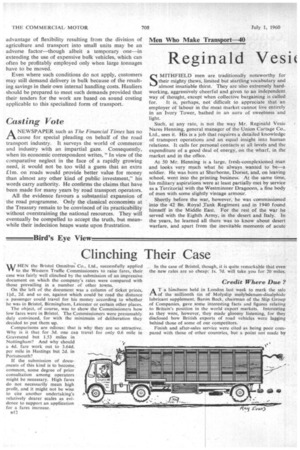Reginald Vesit
Page 46

Page 47

If you've noticed an error in this article please click here to report it so we can fix it.
fares Henning SMITHFIELD men are traditionally noteworthy for their mighty thews, limited but startling vocabulary and almost insatiable thirst. They are also extremely hardworking, aggressively cheerful and given to an independent way of thought, except when collective bargaining is called.
for It is perhaps, not difficult to appreciate that an employer of labour in the meat market cannot live entirely in an Ivory Tower, bathed in an aura of sweetness and light.
Such, at any rate, is not the way Mr. Reginald Vesie Nares Henning, general manager of the Union Cartage Co., Ltd., sees it. His is a job that requires a detailed knowledge of transport operations and an equal insight into human relations. It calls for personal contacts at all levels and the expenditure of a good deal of energy, on the wharf, in the market and in the office.
At 50 Mr. Henning is a large, fresh-complexioned man and looks very much what he always wanted to be—a soldier. He was born at Sher borne, Dorset, and, on leaving school, went into the printing business. At the same time, his military aspirations were at least partially met by service as a Territorial with the Westminster Dragoons,.a fine body of men with some slightly vintage armour.
Shortly before the war, however,he was commissioned into the 42 En. Royal :Tank Regiment and in 1940 found himself in the Middle East. For the rest Of the war he served with the Eighth Army, in the desert and Italy. In the years, he learned all there was to know about desert warfare, and apart from the inevitable moments of acute
panic associated with the fall of shot and the delicacy of
mines, he enjoyed it. .
He liked the company of his men, he fitted into the cheerful intimacies of fighting and living in a tank, and there were occasionally the civilizing fleshpots of the Canal Zone or the convalescent camps of Palestine. At the end of the war he decided to soldier on. He was posted to Saudi Arabia with a military mission concerned with the training of local troops in the use of armour.
In time, British influence in Saudi Arabia gave place to American, and Mr. FIenning, now married, in a station on which there were no married quarters, decided to send in his papers. He moved on to Kenya,where he soon found himself in charge of the transport of the Nakuru depot of the Department of Agriculture. This, however, was the early 'fifties and troubles with the Kikuyu and Mat, Mau were already widespread. There were a great many interruptions in the work of running Government transport, much of which had to be put to purposes quite differentfrom those envisaged by the department. Mr. Henning often enough served as a part-time policeman, working with motorized detachments away from his home, while his wife gallantly carried on with the problems of bringing up children—with a loaded revolver on her hip.
War in the Garden
It was a time of over-taut nerves, bloodshed and.rather frightening uncertainties. Then came the day when there was a pitched battle in the Henning garden. Now convinced that this was no way to educate the young, Mrs. Henning gave the Kikuyu best and returned home. Her husband followed her a few months later.
Back in London, Mr. Henning invested a little available money in an East End meat-haulage business. This move, for diverse reasons, was not to prove entirely happy, but . for three years he learned a specialized trade intimately. He learned the hard way, but out of evil cometh good. In 1957, he moved to Union Cartage, the largest private operators in the business.
For two years he acted as assistant to the general manager, -Mr. A. G. Found, and succeeded him on his retirement at the end of last year. Since then he has savoured little leisure, yet one has the impression that he enjoys his work immensely. It is a demanding job, much of it done on the telephone: even at home, at all hours of the day and night, the bell is seldom silent.
The haulage of chilled or frozen meat is beset by its particular risks. Delay, throUgh breakdown or other reasons, has to be avoided at all costs. An immobile vehicle may mean that the load has to be put into cold store at once, and it is in Mr. Henning's office that the emergency plan must be made.
Baffling Paradox Labour relations and negotiations are also an important and worrying part of his work. Somewhat wearily, he has been known to wonder why he never took a course in industrial psychology or man-management. He has yet to understand the mental process by which a man will take one point of view in personal discussion and a totally different one in collective bargaining. However, he accepts his lot with great cheerfulness and gets results with patience and good humour. In fact, he understands men very well indeed and is adept at earning co-operation.
At his home at Limpsfiekl his leisure hours are spent in relaxing in his family life and in breeding golden retrievers. Essentially a retiring man, he has a deep interest in the development of children, and not only his own. He devotes an evening a week to the local youth club. It is unlikely that a course in psychology would teach him anything he doesn't know about his fellows. T.W.




























































































































































